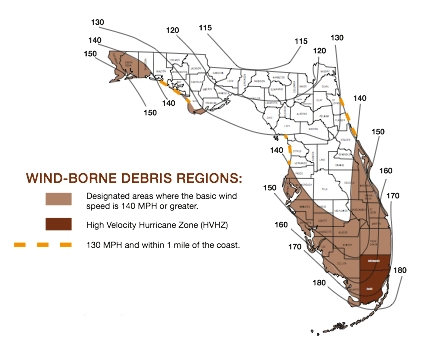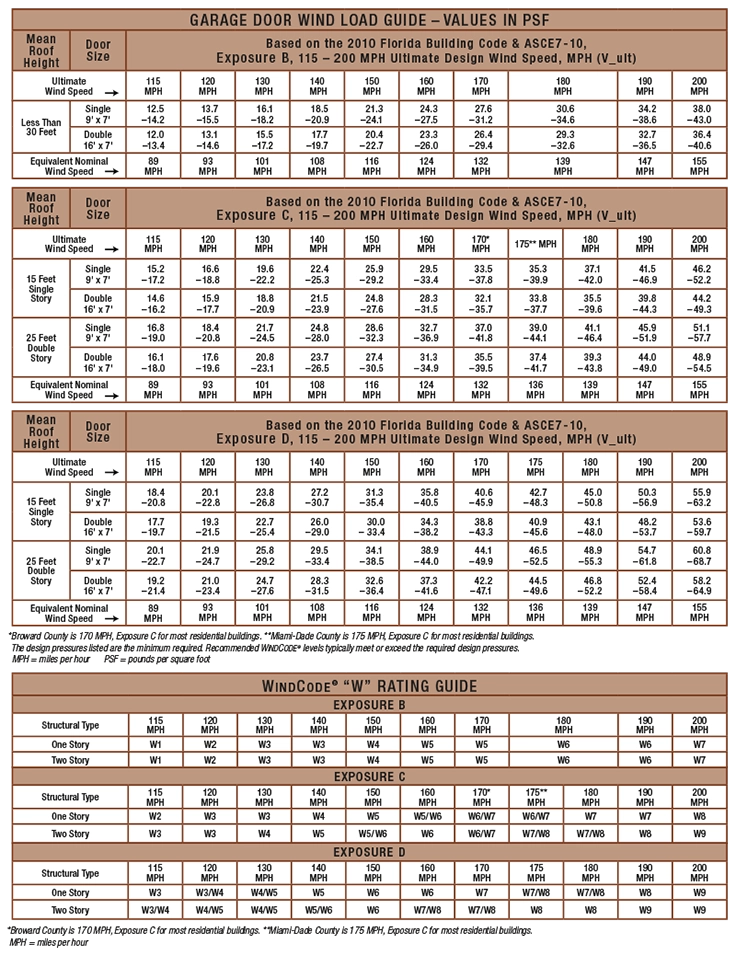Florida WindCode® Door Information

Clopay assigns a WINDCODE® “W” rating to our doors based on code requirements determined by wind speed in miles per hour (MPH), home exposure and home structural type.
Take a look below at the steps to determine your WindCode® rating.
Determine the minimum wind speed (MPH) your door must meet or exceed from the map below, or go to http://windspeed.atcouncil.org/. Determine if wind-borne debris is applicable. See map below.
Wind-borne Debris
The wind-borne debris region is also known as those areas that require the large missile impact rated windows. In Florida, being farther south and closer to the shoreline, it is more likely a home or building will be in the wind-borne debris region.
High Velocity Hurricane Zone (HVHZ)
Miami-Dade and Broward Counties require all garage doors meet the large missile impact rating, regardless if the garage door has windows or not. Standard windows are not available in Miami-Dade and Broward Counties.
Insurance companies sometimes give discounts for garage doors and other exterior building products that exceed the local building code, including meeting wind-borne debris requirements not mandated. This means that installing a new garage door with the large missile impact rating may reduce your insurance premiums. Please check with your insurance agent for details.

Exposure B is defined as urban and suburban areas, wooded areas or other terrain with numerous closely spaced obstructions.
Exposure C is defined as open terrain with scattered obstructions including flat open ground, grasslands. All of Miami-Dade and Broward Counties is Exposure C, unless meets Exposure D definition.
Exposure D is defined as being within 600 ft. of the ocean front or other large body of water measuring at least 5,000 feet across. Contact building code official or DASMA Technical Data Sheet #155t for design pressures.

Using wind speed (MPH), exposure and structural type, find your required design pressure and WINDCODE® Door “W” rating in the charts below.
Design Pressures
The design wind load pressure rating of a door as expressed in PSF (pounds per square foot). The design pressure of the door must equal or exceed the design pressure for the garage door opening that a door is to be installed. Design pressure has positive and negative values.

Clopay® Florida WindCode® Door Literature
DASMA Technical Data Sheet 155x (TDS 155x)- This is a wind load guide that provides design pressures for common door sizes, wind speeds and exposure levels based on the 2020 Florida Building Code.
DASMA Technical Data Sheet 188 (TDS 188) - Explains how insurance mitigators may require additional level of approval (primarily impact ratings) that may not be required by code. This may allow homeowners to obtain discounts on their insurance premiums.
DASMA Technical Data Sheet 161 (TDS 161) - This document provides some clarification about the requirements and limitations of some of the methods of attaching garage door jambs to structural members of various buildings.
To find a Clopay Dealer near you, use our convenient Dealer Locator.

